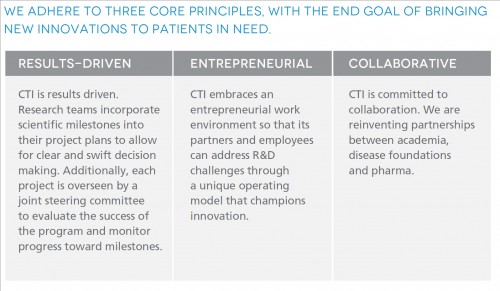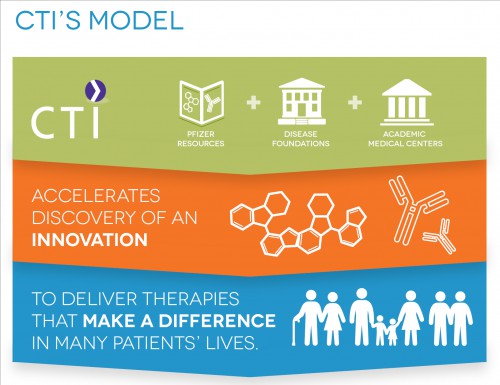Pfizer’s Centers for Therapeutic Innovation (CTI) Model
Thursday 29 August 2019
Article by Josh Bihary, Manager, Government Relations & External Affairs, Pfizer Australia Pty Ltd

Pfizer’s Centers for Therapeutic Innovation (CTI) model is transforming the traditional approach to drug discovery by rewiring the R&D ecosystem with the goal of creating new, targeted therapies for patients living with disease. By departing from the historical approach to R&D, Pfizer is working to solve key challenges of drug discovery, namely the high cost and substantial time investment required to bring a scientific idea to patients in need.
CTI is a pioneering research and development network that is designed to use an open innovation model to bring great ideas to fruition. Part of Pfizer, CTI is an entrepreneurial group that partners with leading academic medical centers and disease foundations with the aim of translating promising science into clinical candidates.
The CTI model is based on authentic collaboration reflected in shared decision making, joint intellectual property ownership, aligned incentives, and the bringing together of cutting-edge academic and industry resources to develop potential medicines faster and more efficiently.
Over the past decade CTI has expanded to include locations in Massachusetts, New York and California with facilities conveniently located on or near academic campuses, allowing research partners to work closely with Pfizer scientists, with the ultimate goal of moving a therapeutic hypothesis through to Proof-of-Mechanism in humans.
Australia was the first location outside the US to join the CTI network, developing unique collaborations with University of Queensland, University of Melbourne, and Monash University.

CTI has quickly become a premier partner of choice for leading academic medical centers and disease foundations for translating promising science into potential clinical candidates. With Pfizer’s backing, CTI offers funding and resources to principal investigators and post-docs at academic medical centers to conduct research and development on promising therapeutics or hypotheses.
In the large-molecule arena, the unique collaboration model allows for the potential to jointly discover and develop therapeutic candidates from early research through Proof-of Mechanism in humans. Research partners are given unprecedented access to Pfizer’s world-class technologies. In the small-molecule arena, partners have the opportunity to access Pfizer’s small-molecule libraries and draw upon the company’s extensive chemistry expertise and experience.
Throughout the year, CTI issues calls for proposals to academic medical centers in its network for innovative new project ideas. Each approved project is conducted jointly by Pfizer and academic scientists. The overarching collaboration is overseen by a joint steering committee comprised equally of representatives from both Pfizer and the academic medical center to evaluate the progress of the program and whether milestones are successfully met.
Unique to the large molecule model is the joint intellectual property ownership between researchers and CTI, together with broad rights to publication. This provides researchers and medical centers with a rare level of investment in the collaborative work, together with the potential for traditional milestone payments. Pfizer also takes an innovative approach to investigator use of research data from terminated programs in order to maximise the possibility of an eventual medical breakthrough.
“To bring research from the bench to the bedside requires leading science, commercial acumen, and collaboration. We cannot rely on medicines and breakthroughs of the past to solely support the healthcare needs of the future. Pfizer is immensely proud of the CTI initiative. This is an exciting frontier that could lead to medical breakthroughs that change patients’ lives.” – Dr Uwe Schoenbeck, Senior Vice President, Worldwide Research & Development, Pfizer.
In October 2010, CTI announced the first partnership with the University of California – San Francisco. Since then CTI has partnered with more than 30 leading academic medical centers and has commenced over 80 joint research projects.
Pfizer and CTI make available their resources and experience with the aim to speed up the potential creation of life-saving treatments for patients who need them. The unique model provides researchers with large incentives to develop work on the laboratory bench that could make it to the pharmacy shelf.
In this increasingly connected world, the CTI model establishes a new standard of collaboration between medical centres, disease foundations, and the pharmaceutical industry.
